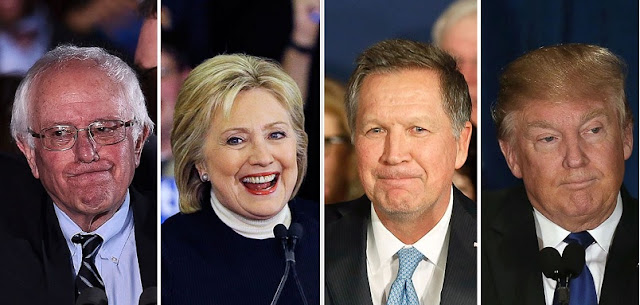By Josep Colomer.
A conversation with Larry Diamond.
I’ve just read your very interesting article with Peter Ackerman in The Washington Post: ‘Make Room for Third-Party Candidates’
Favoring independent candidates may be a good way to make people acknowledge that the current political configuration of candidates for the Presidency has strong potential for a multiparty system. In almost any other democracy, we would have a populist (Trump), a conservative (perhaps Bloomberg? that you mention), a liberal-democrat (Clinton), and a Social-democrat (Sanders), almost exactly as in most European countries.
It occurs to me that after all, perhaps the Presidential Electoral College, which has been so criticized (including by me), might facilitate a parliamentarization of the regime. If the electors represented four major candidates, they could form a multi-party majority in the College to elect the President, as in the typical parliamentary procedure.
Some major obstacles exist, of course, for such a prospect. One is your topic: the high cost of putting candidates on the ballot (which may be overcome, nevertheless). A more difficult one is, certainly, the electoral system. A possible solution would be to use for the College the kind of proportional or hybrid representation rules that are already used in most states for the primaries. This would require for the states only to be consistent in their choices of voting rules.
Seen in this perspective, the relative benefits of changing the rules just a little regarding the current mess would be huge. The current system demands dozens of millions of voters to “coordinate” around one candidate per party. People need to make calculations and strategic estimates that are even much more difficult than ever in the current landscape of extremely fragmented media, social networks and permanent messaging. In contrast, facilitating a multi-candidate race and their fair representation in the College would require only a trivial post-electoral coordination around a winner by electors and party bosses.
Larry Diamond said…
(Stanford University and co-editor of the Journal of Democracy)
Josep,
Thank you very much for this provocative reply. It stimulates many thoughts on my part. The problem we face is that we increasingly have a multiparty sociological tendency struggling against the boundaries of a two-party straitjacket. This worked well enough when the party establishments were able to marginalize the extremes and nudge their parties toward the nomination of candidates who leaned in toward the center and the median voter. But as the primary election process has become increasingly polarized and ideological, the parties are drifting toward the extremes, with the danger that the middle will not be represented.
One solution would be to make the Electoral College fully proportional–but not in the way some states now do it, by Congressional district. Because of the gerrymandering of electoral districts, that does not yield true proportionality but instead can misrepresent the popular vote in a state (e.g. Pennsylvania). If the whole Electoral college were purely proportional, then in theory a third-place candidate could negotiate to throw his electors to the one of the top two candidates who was willing to make the most concessions, and maybe share power. But in a presidential system, it is hard to enforce this, especially if the smaller party(ies) don’t have congressional caucuses as well that could hold up legislation.
I don’t think proportionality principles fit well with presidentialism, so I would favor either a two-ballot method of election as in France–where the third (and fourth?) place finisher could throw his support to the one of the remaining two who made the most concessions, or ranked-choice voting, where this would happen automatically. But if the third place candidate were off to an ideological or populist extreme, then the need to win them over could have the opposite effect.
I would favor eliminating the electoral college, going to a national popular vote, and using RCV or the two-ballot system to elect a candidate. I would favor over that reform a switch to a parliamentary system, but it ain’t going to happen in the US.
Larry



